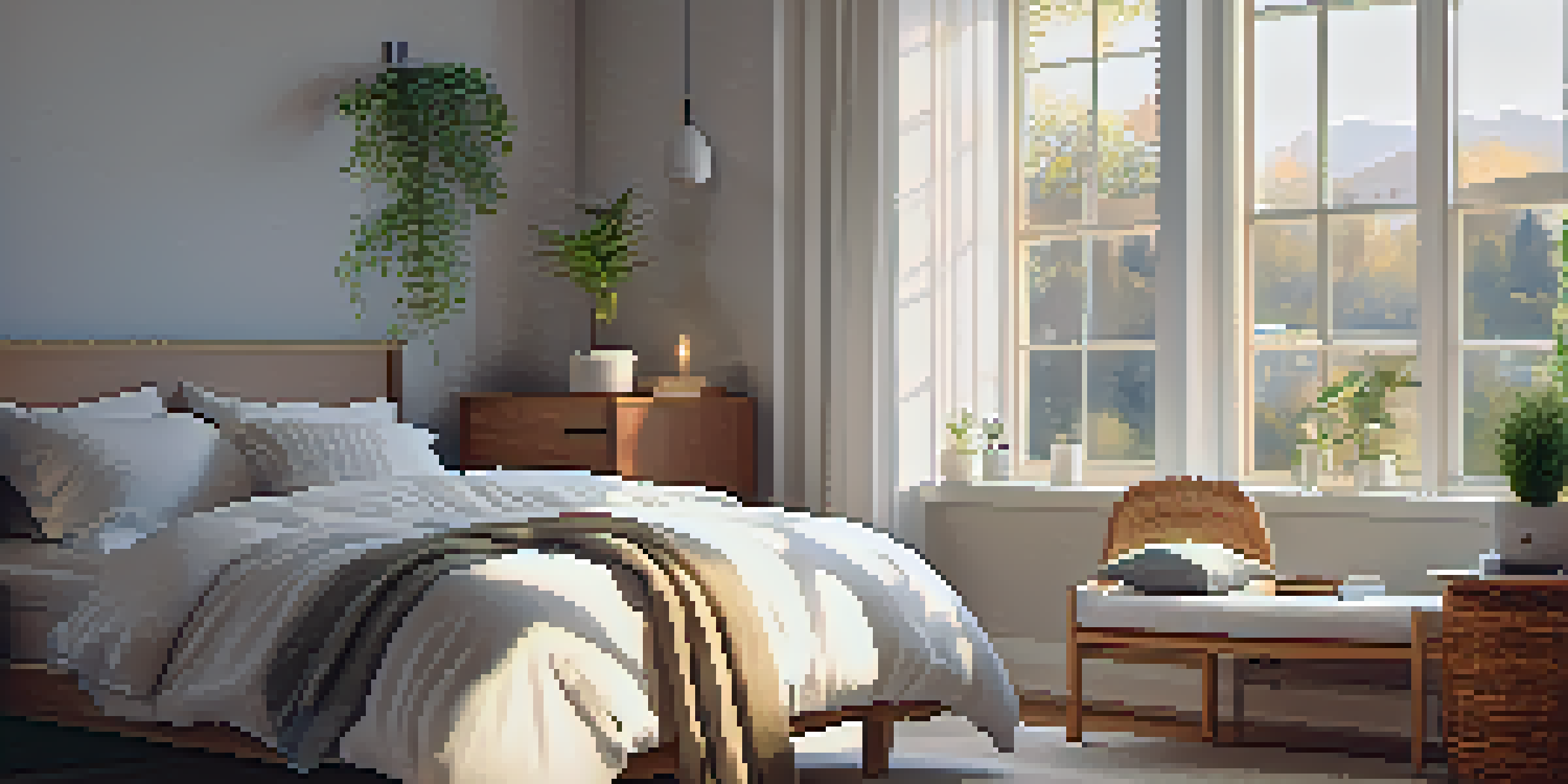Sleep Hygiene Myths: Debunking Common Misconceptions

Myth 1: You Can Catch Up on Sleep During the Weekend
Many people believe that sleeping in on weekends can compensate for lost sleep during the week. While it might feel good to get a few extra hours, this practice can actually disrupt your body's natural sleep-wake cycle. Consistent sleep patterns are key to improving sleep quality and overall health.
Sleep is the golden chain that ties health and our bodies together.
When you irregularly shift your sleep schedule, it can lead to what's known as 'social jetlag.' This condition can leave you feeling groggy and fatigued, even after a long weekend of rest. Instead, aim for consistent sleep and wake times throughout the week to help your body find its rhythm.
Ultimately, while a late sleep-in might seem tempting, it's better to prioritize good sleep hygiene every night. Small changes, like establishing a regular bedtime, can significantly enhance your sleep quality.
Myth 2: A Nightcap Helps You Sleep Better
Many believe that drinking alcohol before bed can promote better sleep, but this is a common misconception. While alcohol may initially make you feel drowsy, it actually interferes with your sleep cycles, particularly REM sleep, which is crucial for restorative rest. This disruption can lead to waking up feeling less refreshed.

Additionally, consuming alcohol can increase the likelihood of sleep disturbances, such as snoring or sleep apnea, further compromising sleep quality. So, while a nightcap might seem like a cozy way to wind down, it may be doing more harm than good.
Sleep Consistency Matters Most
Maintaining a regular sleep schedule is crucial for optimal rest and overall health.
For a better night's sleep, consider alternatives like herbal teas or a warm bath before bed. These options can help you relax without the negative effects associated with alcohol consumption.
Myth 3: You Need 8 Hours of Sleep Every Night
The idea that everyone needs a strict eight hours of sleep is a myth. Sleep needs vary among individuals, influenced by factors like age, lifestyle, and overall health. Some people feel refreshed with just six hours, while others may need up to ten hours to function optimally.
The best bridge between despair and hope is a good night’s sleep.
Instead of fixating on a specific number of hours, it’s more beneficial to listen to your body. Pay attention to how you feel after different amounts of sleep, and aim for a duration that leaves you feeling alert and energized during the day.
Quality is just as important, if not more so, than quantity. Prioritizing deep, restorative sleep can lead to better health outcomes than merely counting hours spent in bed.
Myth 4: Napping Is Bad for Your Sleep
Many believe that napping during the day can negatively impact nighttime sleep, but this isn't universally true. Short naps, typically lasting 20-30 minutes, can actually boost alertness and improve cognitive function. However, longer naps, particularly those taken later in the day, can interfere with your ability to fall asleep at night.
Napping can be a useful tool if you approach it thoughtfully. If you find yourself feeling sleepy in the afternoon, a quick power nap might help recharge your energy levels without compromising nighttime rest.
Alcohol Disrupts Sleep Quality
While alcohol may make you feel sleepy, it actually interferes with important sleep cycles.
To make the most of napping, keep it consistent and avoid lengthy naps after 3 PM. This way, you can enjoy the benefits of napping without sacrificing your nighttime sleep.
Myth 5: You Shouldn't Exercise Before Bed
There's a belief that exercising too close to bedtime will keep you awake, but research shows that this isn't always the case. For many, engaging in physical activity can help reduce stress and anxiety, leading to better sleep. The key is to find the right type of exercise and timing that works for you.
Light to moderate exercise in the evening can promote relaxation and prepare your body for sleep. However, high-intensity workouts right before bed may be too stimulating for some people, potentially leading to difficulty winding down.
If you're unsure, experiment with different types of exercise at various times of the day. You might find that an evening yoga session helps you sleep better than you thought!
Myth 6: Your Bedroom Should Be Completely Dark
While a dark environment is often recommended for sleep, complete darkness isn't necessary for everyone. Some individuals find that a small amount of ambient light, such as a night light or soft lamp, can provide comfort and help them relax. The key is to create an environment that feels safe and soothing to you.
It's also worth noting that light exposure in the morning can help regulate your circadian rhythm. Natural light helps signal to your body that it's time to wake up and be alert, while darkness in the evening encourages the production of melatonin, the hormone that promotes sleep.
Naps Can Boost Alertness
Short naps can enhance cognitive function without negatively impacting nighttime sleep if timed correctly.
Finding the right balance of light in your bedroom can play a significant role in enhancing your sleep experience. Experiment with different lighting options to see what works best for you.
Myth 7: Using Electronics Before Bed Is Fine
Many people think that using their phones or watching TV before bed is harmless, but this myth can lead to poor sleep quality. The blue light emitted by screens can interfere with the production of melatonin, making it harder to fall asleep. This is particularly problematic if you're scrolling through social media or watching stimulating content.
To promote better sleep hygiene, consider establishing a 'screen-free' time before bed. Aim for at least 30 minutes without screens to allow your mind to wind down and prepare for sleep.

Instead of electronics, try reading a book, listening to calming music, or practicing relaxation techniques. These activities can help signal your body that it's time to transition into sleep mode.
Myth 8: Sleep Aids Are Always the Solution
There's a common belief that over-the-counter sleep aids are a quick fix for sleep issues, but they often come with drawbacks. Many sleep aids can lead to dependency and do not address the underlying issues causing sleep disturbances. Instead of relying solely on medication, consider exploring natural remedies and lifestyle changes.
Adopting good sleep hygiene practices, such as creating a calming bedtime routine, can often lead to better results than medication alone. Techniques like mindfulness, relaxation exercises, and consistent sleep schedules can make a significant difference in your sleep quality.
If sleep problems persist, it's essential to consult with a healthcare professional. They can help identify any underlying issues and suggest appropriate solutions tailored to your needs.